#Russian-Chinese relations. International Relations. Syrian crisis
Explore tagged Tumblr posts
Text
تأثير تطور العلاقات (الروسية-الصينية) في الأزمات الدولية - الأزمة السورية نموذجاً
تأثير تطور العلاقات (الروسية-الصينية) في الأزمات الدولية – الأزمة السورية نموذجاً تأثير تطور العلاقات (الروسية-الصينية) في الأزمات الدولية – الأزمة السورية نموذجاً الكاتب : الخزاعلة محمد خلف عاصي ملخص: تحددت مشكلة الدراسة في التعرف على تأثيرتطور العلاقات الروسية-الصينية على الأزمة السورية. وقد هدفت الدراسة إلى التعرف على طبيعة العلاقات الروسية-الصينية ومجالات تطورها. كذلك التعرف على طبيعة تأثير…
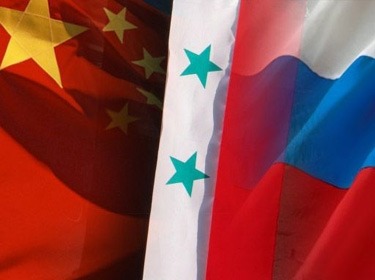
View On WordPress
#Russian-Chinese relations. International Relations. Syrian crisis#العلاقات الروسية-الصينية. العلاقات الدولية. الأزمة السورية.
0 notes
Text
تأثير تطور العلاقات (الروسية-الصينية) في الأزمات الدولية - الأزمة السورية نموذجاً
تأثير تطور العلاقات (الروسية-الصينية) في الأزمات الدولية – الأزمة السورية نموذجاً تأثير تطور العلاقات (الروسية-الصينية) في الأزمات الدولية – الأزمة السورية نموذجاً الكاتب : الخزاعلة محمد خلف عاصي ملخص: تحددت مشكلة الدراسة في التعرف على تأثيرتطور العلاقات الروسية-الصينية على الأزمة السورية. وقد هدفت الدراسة إلى التعرف على طبيعة العلاقات الروسية-الصينية ومجالات تطورها. كذلك التعرف على طبيعة تأثير…
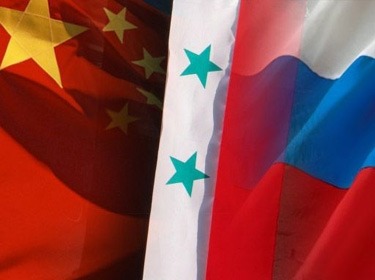
View On WordPress
#Russian-Chinese relations. International Relations. Syrian crisis#العلاقات الروسية-الصينية. العلاقات الدولية. الأزمة السورية.
0 notes
Text
BEIJING (AP) — China and Syria announced the formation of a strategic partnership on Friday as Chinese leader Xi Jinping kicked off a series of diplomatic meetings ahead of the upcoming Asian Games.
Xi met Syrian President Bashar Assad in the southern Chinese city of Hangzhou, which is hosting the 15-day sports competition.
“In the face of the unstable and uncertain international situation, China is willing to work with Syria to firmly support each other ... and jointly safeguard international fairness and justice,” Xi said in a video clip posted online by state broadcaster CCTV.
Assad’s visit parallels in some ways that of Russian President Vladimir Putin last year for the opening ceremony of the Beijing Winter Olympics. Both leaders are virtual pariahs in the West but welcomed by China as it tries to expand its global influence and promote an alternative to the U.S.-led international order.
The Syrian leader will attend the Asian Games opening ceremony on Saturday night along with the king of Cambodia, the crown prince of Kuwait and the prime ministers of Nepal, East Timor and South Korea, China’s Foreign Ministry has said.
Xi also met Kuwaiti Crown Prince Sheikh Meshal Al Ahmed Al Jaber Al Sabah on Friday and said he would work with him to take bilateral relations to a new level, CCTV reported.
Both meetings took place at a state guest house at West Lake, a scenic tourist destination in Hangzhou that has inspired Chinese painters for centuries.
Cambodian King Norodom Sihamoni arrived Friday at the airport in Hangzhou. CCTV video posted online showed him walking down the stairs from his plane to the tarmac for a red carpet welcome that included the Asian Games mascots.
Assad, who is making a rare trip abroad, is looking for ways to emerge from the international isolation brought on by a brutal war at home that shows no sign of ending after 12 years. He was expected to discuss economic assistance from China, which could play a major role in Syria’s future reconstruction.
Syrian state TV quoted Assad as thanking Xi and his government for standing on the side of the Syrian people “during the crisis and suffering.” China has backed Assad, using its veto on the U.N. Security Council eight times to block resolutions against his government.
Xi told Assad that China supports Syria in opposing external interference and unilateral bullying and promoting a political solution that is led and owned by Syrians, China’s CCTV said.
Assad expressed hope that the meeting would be the basis for “wide-ranging and long-term strategic cooperation in all fields” between China and Syria.
The Asian Games, which have more participants than the Olympics, also sparked��a diplomatic row between India and China. Three Indian athletes from Arunachal Pradesh, which China claims as its territory, refused to accept their visas and stayed home after they were given visas stapled to their passports — different from those given to the rest of the team.
The Asian Games were scheduled for last year but postponed because of China’s then-strict pandemic restrictions. China eased its restrictions in December of last year.
2 notes
·
View notes
Text
Few have noted the existence of this monograph by Dmitry Medvedev published in the Russian journal International Affairs on 13 December 2024, “On National Identity and Political Choice: The Experience of Russia and China.” It’s a formal, academic-type essay complete with footnotes and additional commentary by Medvedev. The essay’s important because it explains how Russia and China are being attacked by the Outlaw US Empire and how such methods were used in the past. As we’ve seen in the last few days, president-elect Trump has outlined new belligerence his administration might undertake using its economic hegemony as the main lever since its defeat by Russia in Ukraine has proven its lack of suitable military power. Very little is being said by the nations under attack as to how they’ll repel the belligerence. How that might be done provides a topic for another article. One note before the essay: Other new nations have used the techniques of language and manipulation of the historical past to manufacture their national bonafides when none previously existed. This was most apparent in the creation of Azerbaijan during and after WW1, which was made clear to me during my research on Anatolia. Now for Mr. Medvedev:
On National Identity and Political Choice: The Experience of Russia and China
In fact, it is impossible to beat off the letter "I" in the word "homeopathic" and think that thanks to this the pharmacy will turn from Russian to Ukrainian. M.A.Bulgakov[1]
The party-state visit to the People's Republic of China, which took place on December 11-12, 2024 at the invitation of the Central Committee of the Communist Party of China, once again demonstrated the unprecedentedly high level of bilateral relations between Russia and China. We have no taboo topics for discussion. During the talks with our Chinese partners, they touched upon the Ukrainian problem, the Syrian crisis, and issues of countering unilateral economic restrictions adopted in circumvention of the UN Security Council. The reason for such a trusting dialogue is obvious. The Russian and Chinese peoples are linked by friendship and good-neighbourliness, which are based on deep historical traditions. In 2024, we celebrated the 75th anniversary of the establishment of diplomatic relations and the founding of the People's Republic of China. Despite the fundamental changes taking place in the world due to the formation of a multipolar world, there are also constants that have remained unchanged for decades. Russia and China continue to bear responsibility for the present and future of mankind. We will continue to carry out this difficult mission together, solving the problems left over from the past, which I would like to dwell on in more detail.
1 note
·
View note
Text
Headlines
The Wuhan Virus Seems Like a Pandemic (Foreign Policy) As cases of the Wuhan coronavirus spread beyond China, global health experts say that the disease seems likely to be a pandemic--meaning an epidemic that exists on two or more continents at once. The virus has already appeared in around two dozen countries. As of Monday, Chinese officials had confirmed 17,205 cases of the virus and 361 deaths. The coronavirus is straining China’s health resources, particularly at the center of the outbreak in Wuhan. A new hospital in the city--constructed in just eight days--was due to open Monday, with 1,400 military medical staff arriving to run it.
U.S. farm bankruptcies hit an 8-year high in 2019 (Yahoo) Although farmers were able to celebrate the passage of the USMCA and signing of a phase one U.S.-China trade deal, many are still facing an existential crisis. According to U.S. Courts data, U.S. farm bankruptcy rates increased by 20% in 2019, an eight-year high. There were a total of 595 Chapter 12 bankruptcies filed by family farmers. “A lot of the bankruptcies have been on the dairy side of life,” Veronica Nigh, senior economist for the American Farm Bureau, told Yahoo Finance.
Trump Eases Restrictions on Land Mine Use by U.S. Military (Reuters) President Donald Trump on Friday relaxed Obama-era restrictions on the U.S. military’s use of anti-personnel land mines, arguing that the previous policy could put American troops at a “severe disadvantage.”
Mexican avocados and gangs (Foreign Policy) In Mexico, a boom in avocado exports has attracted the attention of criminal gangs. The avocado industry brings in $2 billion per year for the Mexican economy and its newfound popularity with criminals is linked to the U.S. opioid crisis. “Americans’ increased use of fentanyl, a synthetic opioid used for pain relief, pushed down the price of heroin, which in turn slashed the price of Mexican opium,” according to the Financial Times, forcing gangs to diversify. Experts warn that the avocado trade is starting to resemble that of conflict minerals in Africa. “So dangerous has the avocado business become that several municipalities have armed private security guards to protect towns,” the FT reports.
Watchdog Group Says Guyana Lost Billions in Exxon Oil Deal (AP) A natural-resource watchdog group alleges in a new report that Guyana may have lost as much as $55 billion in potential revenue by poorly negotiating a deal with Exxon Mobil to pump reserves that are expected to make the small South American country into the world’s newest major oil producer.
Violence Erupts Again in Santiago After Soccer Fan Run Over by Police (Reuters) Riots broke out in parts of Santiago overnight and lingered into Thursday after a police truck ran over and killed a soccer fan earlier this week, marking the most violent protests since unrest broke out late last year, authorities said.
London police shoot and kill terror suspect (Foreign Policy) On Sunday, police in London shot and killed a man who stabbed two people on a busy street in broad daylight in what authorities described as a terrorist incident. Police said that the man had strapped a fake explosive device to his body and witnesses said he carried out the attack with a machete. Later, reports emerged that the suspect was already under police surveillance and had been released from prison last month after serving time for terrorism-related offenses.
Brexit trade deal clash: UK and EU begin sparring over rules (Reuters) The European Union and Britain clashed over a post-Brexit trade deal on Monday with Prime Minister Boris Johnson insisting he need not sign up to the bloc’s rules and Brussels warning of tariffs and quotas unless he did.
Drone presence forces Madrid’s Barajas airport to close airspace (Reuters) Madrid’s Adolfo Suarez-Barajas international airport closed its airspace on Monday for at least two hours after pilots spotted drones in the takeoff area alongside the airport, Spain’s transport ministry said.
Greek police fire teargas at protesting migrants, refugees on Lesbos (Reuters) Greek police fired teargas to disperse migrants and refugees protesting on Monday about conditions in migrant camps on the island of Lesbos and the slow pace of processing asylum requests.
Much of eastern Europe saw warmest January on record (Washington Post) Helsinki, Oslo, Copenhagen and Stockholm surpassed freezing every day in January for the first time. Moscow’s average January temperature was above freezing for the first time.
Ukraine: Recordings show Iran knew jetliner hit by a missile (AP) A leaked recording of an exchange between an Iranian air-traffic controller and an Iranian pilot purports to show that authorities immediately knew a missile had downed a Ukrainian jetliner after takeoff from Tehran, killing all 176 people aboard, despite days of denials by the Islamic Republic. In Tehran on Monday, the head of the Iranian investigation team, Hassan Rezaeifar, acknowledged the recording was legitimate and said that it was handed over to Ukrainian officials.
Russian Plane Makes Emergency Landing After Passenger Bomb Threat (Reuters) A Russian plane made an emergency landing in Moscow on Thursday after a woman passenger stood up in the aisle and threatened to blow herself up, but police later said no explosive device had been found on her, news agencies reported.
8 Turkish personnel, 13 Syrian troops killed in north Syria (AP) Turkey hit targets in northern Syria, responding to shelling by Syrian government forces that killed at least eight Turkish soldiers and civilian contractors, Turkey’s president said Monday. A Syrian war monitor said 13 Syrian troops were also killed. The exchange of fire inside Syria between Ankara and Damascus came hours after a large Turkish military convoy entered the northwestern province of Idlib, the last rebel stronghold in Syria. The fighting is likely to further increase tensions between the two neighboring countries, as such direct clashes have been rare. It could also cause friction between Russia and Turkey, which have sought to coordinate their actions in Syria.
South African Court Issues Arrest Warrant for Ex-Leader Zuma (AP) A judge in South Africa issued an arrest warrant Tuesday for former president Jacob Zuma for failing to appear in court on a corruption case that he has sought to avoid for months.
4 notes
·
View notes
Text
Turkey and USA. Allies or Opponents
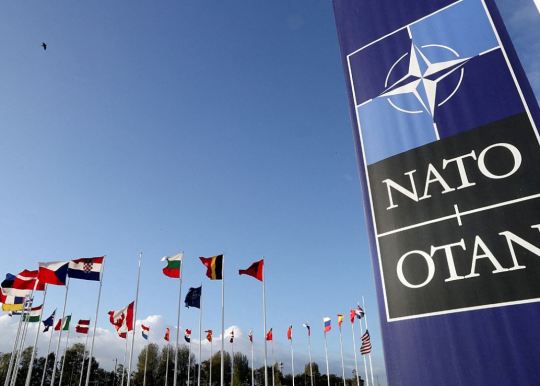
The United States of America and Turkey, which are allies in the NATO bloc, have long been experiencing a deep political crisis, as the opinions of the leaders of the states drastically differ on a number of issues. It all started with Turkey's refusal to give its consent to the expansion of the Alliance through the entry of Sweden and Finland into it. According to the provisions of the North Atlantic Treaty, the entry of new members requires the consent of all NATO member states. Turkey deliberately drags out this process, which cannot but cause displeasure with the United States, which considers itself the dominant force that determines NATO's policy. Another area in which the interests of the two states clashed was military-technical cooperation. Against the background of contradictions over NATO, the Americans decided to suspend the issue of considering the supply of their F-16 fighters to the Turkish side. In response to this, Ankara threatened to abandon the deal altogether, seeing Russian and Chinese military aircraft as a worthy alternative. Refusal of the deal means for the US multimillion-dollar losses. And finally, Syria. Here, the policy of Washington and the United States results in open clashes between various factions that support both sides, which further drags Syria into the abyss of a military conflict. The Kurdish question was chosen as the subject of controversy. The United States, which considers itself allies of the Kurds, is concerned about the Turkish presence threatening the Kurdish population of northern and eastern Syria. The proof was the murder of Kurds in Genderes, which we talked about above. As the Syrian Democratic Forces confront the Syrian National Army, the politicians are fighting in the political arena. Now Erdogan is trying to establish ties and move on to considering the issue of a non-military settlement of the Syrian war. Quadripartite talks with the participation of Russia and Iran, constant meetings and telephone conversations at the highest political level, as well as a range of other measures, indicate that Turkey plans to improve relations with Damascus and does not want further confrontation. In turn, Washington is not going to sit idly by. Dissatisfied with this development of events, he does everything possible to prevent the strengthening of diplomatic ties between the two states. Thus, the representative of the US State Department, V. Patel, strongly condemned the fact that a number of states are taking steps to restore cooperation with the "Assad regime." He stressed that he would not encourage the actions of third countries and did not intend to restore relations with Syria. Moreover, he accused Assad of trying to rehabilitate himself in the international arena against the background of the earthquake, which became a national tragedy.
0 notes
Photo
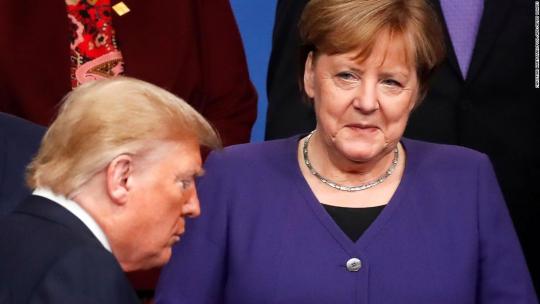
New Post has been published on https://techcrunchapp.com/trumps-america-first-presidency-all-but-ended-us-global-leadership-the-world-was-outgrowing-it-anyway/
Trump's America First presidency all but ended US global leadership. The world was outgrowing it anyway

But the global instruments Trump deserted haven’t crumbled, nor is the world crashing and burning with its long-time leader in the back seat. Strongman leaders may be emboldened, but they aren’t going entirely unchallenged. And old US allies have not fallen straight into the arms of China, as many analysts fear.
Instead, the world is adapting these agreements, it’s reshaping its institutions and, as for China, most countries are finding ways to balance their relations with Beijing as both a friend and foe.
This shift has been a long time coming. While US grand strategists who believe American world leadership is exceptional argue it could go on in its role indefinitely, most international relations experts agree that all unipolar models must come to an eventual end, as other powers rise and challenge its primacy.
After assuming the role of leader following World War II, the US proved its dominance with its victory in the Cold War, a consolidation of power that experts described as a “unipolar moment.” That moment has lasted 30 years.
There have been clear signs over the past two decades, however, that Americans are tiring of taking on this role, while much of the world, equally, is cooling on the US as its hegemon, and is eager to step into its shoes.
Germany, for example, is pitching itself as a global health leader. Even before the pandemic, German Chancellor Angela Merkel had put global health on the agenda at G20 meetings for the first time as the Trump administration showed signs of retreat from international cooperation. Germany has boosted funding for health research and development, and was even able to treat patients from neighboring countries for Covid-19 early in the European outbreak, so well-resourced were its hospitals at a time of crisis.

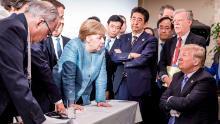

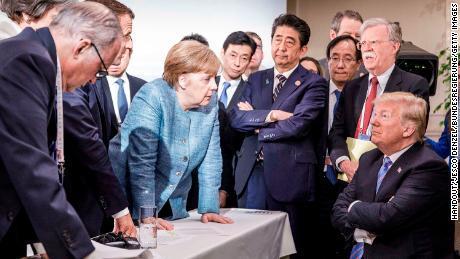
As the US attempted to lead reforms of the World Health Organization — despite its decision to abandon it — Merkel and French President Emmanuel Macron proposed their own an alternative plan, after rejecting Washington’s, as Reuters reported.
Germany has pledged an extra 200 million euros ($234.1 million) to the WHO this year, making for a total of 500 million euros, to help plug the gap left by the US, traditionally the organization’s biggest donor. It’s not the only one. The UK announced last month it would boost its WHO funding by 30% over the next four years, which would make it the biggest donor, should the US follow through with its withdrawal.
China, under international pressure to resource the global response, has also pledged additional funding, as has France, Finland and Ireland, among others. It’s unclear whether they will be able to make up for the US’ shortfall in the years to come, but it’s at least a good start.
Merkel — often described as the world’s “anti-Trump” — said in May she wanted the European Union to take on more global responsibility for the pandemic and for the bloc to harness a more powerful voice overall on the values of “democracy, freedom and the protection of human dignity,” describing cooperation with the US as “more difficult that we’d like.”
Making comments in a speech ahead of Germany assuming the six-month presidency of the European Union, Merkel said she saw her country’s presidency as an opportunity to be an “anchor of stability” in the world that could shape change and assume responsibility for global peace and security.
“Itself a project between individual states, the European Union is inherently a supporter of rules‑based multilateral cooperation. This is truer than ever in the crisis,” Merkel said.
Macron too tried to pitch himself as the next leader of the free world in the earlier days of Trump’s presidency. His campaign lost steam, but he still often plays the democratic defender in the room where the US is missing, having confronted Russia’s Vladimir Putin on his country’s role in the Syrian conflict and on the deterioration of gay rights in Russia, and Saudi Crown Prince Mohammed bin Salman on the murder of his critic, Jamal Khashoggi, at a Saudi consulate in Turkey.
While EU leaders’ will to replace American leadership is strong, the lack of progress in the areas Macron has tried to address are a sobering reminder of the limited power the world has to uphold democratic values without the United States at the helm.

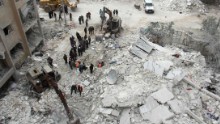

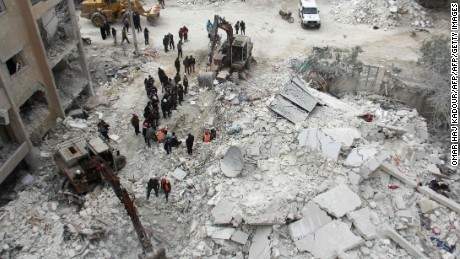
Putin had his wrist slapped, but the abuse of gay Russians continues, and Russia and its firepower has all but won the war for Syrian President Bashir al-Assad. Bin Salman has been forced to keep a lower profile, but Macron’s confrontation has done little to threaten his position of power.
The European Union is also losing its battle with the rise of autocracy in some of its eastern states, like Hungary and Poland, or countering Russian influence in that part of their bloc.
But they continue to try and their own alliances are strengthening. Take the E3. UK Prime Minister Boris Johnson should be Merkel’s and Macron’s worst enemy, as tense Brexit trade talks crash out ahead of the UK’s December 31 withdrawal from the EU. Remarkably, the three are still chummy on topics other than Brexit.
The E3’s whole raison d’etre has been to counter US foreign policy, coming together informally during the Iraq war and to engage Iran on nuclear proliferation where the US wouldn’t. But it has become tighter knit in the Trump era — the trio have openly opposed US sanctions on Iran and increasingly cooperate in areas like Beijing’s territorial expansionism in the South China Sea and the Syrian conflict as the US shows less interest in those security challenges.
Members of the trans-Atlantic defense alliance, NATO, have also had to adapt to a less present US. The alliance has had plans to boost funding since Russia’s annexation of Crimea in 2014, an audacious move that the Obama administration did little about. Trump’s aggressive criticism of member nations contributing below their commitments of 2% of GDP applied further pressure on several members to pay their share.
A long time coming
There may be no easy replacement for US leadership, but Scott Lucas, a professor of international politics at the University of Birmingham, points out that Washington hasn’t achieved many of its recent international security objectives, either. “Asia, the Middle East, Africa, in many parts, disorder continues to a great extent,” he said.
The list of US failures in international security is long. The US hasn’t been able to build legitimate states in Iraq and Afghanistan, as it sought to. Israelis and Palestinians are no closer to peace deal. Both Iran and North Korea have developed nuclear weapons. The US hasn’t prevented Russia from exerting influence in Eastern Europe. It hasn’t convinced China to end its military aggressions in Asia. These were all true before Trump’s rise.
Lucas said that the Trump presidency hasn’t really been the turning point in this shift. President George W. Bush’s invasion of Iraq was the “critical moment.”
“A lot of countries were discomforted, to say the least. They felt the war wasn’t justified — countries like France, Germany, Australia — that a unipolar America with the UK tagging along wasn’t working, especially when Iraq turned so horribly wrong, with so many people dying, and the instability that continues. So, the notion that the US leads and everyone follows was shot,” Lucas said.

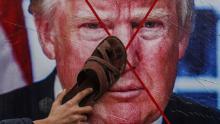

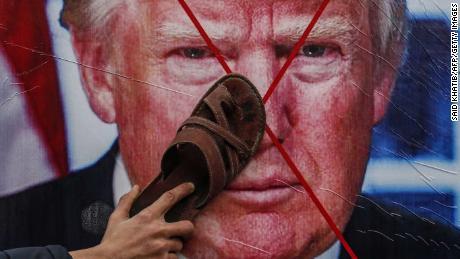
Some experts say China is the only real contender here, and that a bipolar world in which the US and China compete is inevitable. Like in the Cold War, other countries will be forced to choose sides.
China too is finding areas in which to assert its growing power on the world stage with an increasingly absent US. At the UN General Assembly in September, Chinese President Xi called for the world to “join hands to uphold the values of peace, development, equity, justice, democracy and freedom shared by all of us.” In contrast, Trump devoted much of his speech to attacking China over its handling of the coronavirus, playing to his supporter base at home ahead of the November election.
Xi’s comments need to be taken with a grain of salt — Beijing has also taken elements of Trump’s presidency as an opportunity to vindicate its own heavy-handedness at home, in Hong Kong, for example, with its draconian national security law. But Xi does have a genuine appetite to be welcomed as a world leader, a role that will require him to conform somewhat to the rules-based order.
In the same speech in September, Xi made a pledge for China to become carbon neutral by 2060, an ambitious goal that has been met with both excitement and skepticism. Critics point out that China “off-shores” its carbon emissions, largely through its multi-trillion dollar Belt and Road Initiative, which includes development projects across more than 120 countries.

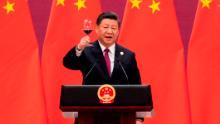

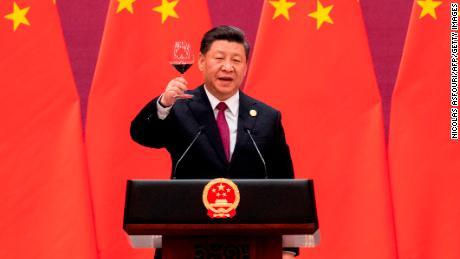
But Beijing is looking at ways to make these development endeavors more sustainable, and Xi’s announcement at least shows that China, the world’s biggest carbon emitter, is willing to lead and engage with the world on this crucial issue, where the US, the second-largest emitter, is not.
Shaun Breslin, a professor of politics and international studies at the University of Warwick, disagrees that the long-term future is necessarily a bipolar one where countries must choose sides between a competing China and US. Instead, he thinks the transition from a unipolar world will be “messy” and more likely give way to clusters of power.
“My problem with poles is we’re trying to use language from a different era and wedge the current era on that linguistic basis. What I think we’ll see is looser constellations of power and interests dependent on specific issue areas,” he said.
The world will see countries continuing to engage China in areas like trade and technology, but not necessarily replacing Washington with Beijing on issues like security or moral leadership. In many ways, that shift has already happened.
Democratic candidate Joe Biden is among those who believe the US should continue to lead. Though he has promised to rejoin institutions like the WHO and the Paris climate accord should he win on Tuesday, he won’t be able to reverse every foreign policy decision Trump has made.
For instance, it will be difficult for Biden to invest the troops and weapons needed to regain the influence the US once had in Syria. He may also find the US’ former Kurdish allies unwilling to work with him, having for years fought alongside the US to defeat ISIS, only to be abandoned last year as Trump gave Turkish President Recep Tayyip Erdogan the green light to invade their territory in a quick phone call.
Biden’s comments during a debate last week on North Korea also suggest he may have no policy that differs from Obama’s, which did little to deter the pariah state.
Regardless of who wins the vote, the US’ role in the world has changed profoundly. Returning to where it was four years ago won’t be easy. Returning to its post-Cold War primacy is near impossible.
0 notes
Text
The new, great, dangerous game in the eastern Mediterranean
New Post has been published on http://khalilhumam.com/the-new-great-dangerous-game-in-the-eastern-mediterranean/
The new, great, dangerous game in the eastern Mediterranean

By Federica Saini Fasanotti In the latest in a series of provocative actions linked to the exploration of oil and gas in the eastern Mediterranean, Turkey recently carried out naval exercises in an area of that sea that Greece also considers its own territorial waters. In doing so, Turkey confronts an energy cartel named the Eastern Mediterranean Gas Forum (EMGF), which includes Egypt, Israel, Italy, Greece, Cyprus, and the Palestinian Authority. The European Union is seeking to mediate, and French President Emmanuel Macron said that the situation is so worrying that France will strengthen its naval contingent in the eastern Mediterranean. But this is just the tip of the iceberg. At the beginning of August, Egypt and Greece signed an agreement — one that Turkey declared “null and void,” not surprisingly — to delimit their exclusive economic zones (EEZs, which are the sea areas in which a state exercises its authority) to allow private individuals to exploit marine and submarine resources. These agreements are regulated bilaterally by the states, even if there is an international framework. The aim was to limit Turkish ambitions in the area and respond to a clear provocation on Ankara’s part: its 2019 signing of a memorandum in Istanbul with the Libyan Government of National Accord (GNA) based in Tripoli on exclusive economic zones and military cooperation.
The Libyan pawn
The Libya-Turkey agreement — which the EMFG does not accept, charging that it violates the Montego Bay Convention of 1982 — had two main objectives: to define the Turkish and Libyan EEZs, respectively, to exploit energy resources; and to allow Turkey to provide military assistance to the GNA in the current Libyan civil war. Ankara’s broader aim is to preempt any possible EMGF project in the area as long as Turkey remains excluded from the group. If the EMGF countries — which in some cases have very tense relations with Ankara — continue to exclude Turkey (or even move to block Turkey from accessing a gas field within its own EEZ, based on an interpretation of the Montego Bay Convention), Turkey could use it as pretext to adopt a more aggressive strategy. In such a scenario, Ankara could put forward international legal obstacles to prevent gas from being released into the region, making it less cost-effective to extract it. The agreement sparked the ire of the GNA’s rival in Libya, Field Marshall Khalifa Haftar, who commands the Tobruk-based Libyan National Army and initiated a siege on Tripoli in April. He has been backed by Egypt and the United Arab Emirates since 2014. They see Libya not only as an optimal platform for expanding their economic aims, but also as a game board for an ideological confrontation with Turkey and Qatar — political representations of the Muslim Brotherhood, which is a sworn enemy for Egypt and the dynasties of Gulf. Libya, in this sense, represents an extraordinary possibility for Abu Dhabi to see its medium-power aims realized, as well as for Cairo to expand its area of influence westward. In fact, Libya’s eastern, coastal region of Cyrenaica has always been a land of trade and deep tribal ties with Egypt. Lately, Cairo has aimed to play a central role in crisis scenarios in the broader Mediterranean, where the problems of the Palestinians intersect with those of the Syrians and Libyans, and where the energy resources are enormous interests that go well beyond the Mediterranean basin. In this context, France seeks to play a leading role: Paris has for some time taken positions opposed to Ankara (on Turkey’s NATO membership, natural gas, migrants, and Libya), and recent months it has strongly supported initiatives by Egypt, Greece, and Cyprus against Turkey. Earlier this year, it asked to become a member of the EMGF, while the United States asked to become a permanent observer. France sees these steps as an opportunity to strengthen its strategy in the Mediterranean. More broadly, though, Europe does not currently have a real strategy to contain Turkey.
The fundamental role of the U.S.
The United States considers this area one of great strategic interest, especially for containing Chinese and Russian interference through regional alignments and allies. The policy objective is to keep the main maritime trade routes — first of all the Suez Canal — safe. In this sense, the goal is to minimize the opportunities for confrontation between the countries of the region, especially with two NATO members involved, Turkey and Greece, and potentially now France. The void left by the United States in the political dynamics of the Mediterranean has been filled, to a growing extent, by China and Russia. The two powers are able to maneuver well in the region, taking advantage of the increasing systemic disorder and growing tensions between states. America should act to prevent this. Washington should start with Libya, pushing the peace process diplomatically and — if the Libyans request it — also militarily through the United Nations, which could organize an international contingent to establish security and create the conditions to revise the November 2019 Turkey-GNA memorandum. This is a fundamental starting point, because only with a stable Libya will the current dynamics among the regional powers wane. At the same time, the U.S. should leverage the allies of the EMGF to arrive at more flexible positions towards Turkey, recognizing its legitimate interests to become a EMGF partner and to have the chance to engage in joint resource exploitation and revenue sharing (and recognizing its terrible economic situation). In exchange, Turkey should contain its regional ambitions, bearing in mind that an armed conflict between these Mediterranean powers would be catastrophic.

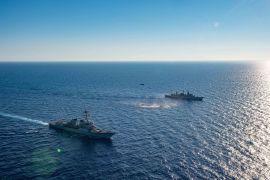






0 notes
Text
Asymmetric: Russia I
Russia has remained a major player in global politics even after the Cold War; of which as a result, its immediate neighbourhood was split into two parts - the satellites (in Eastern Europe) and the proxies (the Balkans and Central Asia). Each parts' significance in global politics determines the scope of the Russian state's involvement. Russia's current investments in Eastern Ukraine, Syria and Libya signify that the state will remain a key player in ensuring international stability in the near future; particularly in security and energy issues. The general question the, is how has Russia maintained notions of its “great power” status, its influence in the world and developed the tools employed in this endeavour?
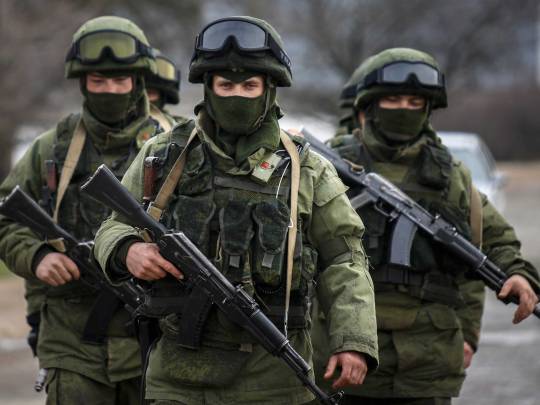
Hostile Measures
In each region, Russian involvement is determined by two denominators - capabilities and goals. In Eastern Ukraine the goal of halting EU/NATO expansion necessitates the use of proxy militias, cyber and electronic warfare. In Syria, the goal is to suppress security threats to a key ally and establish a foothold in Middle Eastern affairs. This has been executed through the use of conventional warfare - massive troop deployments to incapacitate Daesh and Syrian Democratic Forces (SDF) and expansion of naval and air projection in the region. Goals come from Russia’s notions of itself and its history in regional affairs, and these goals are measured up against an array of tools. Tools which fall under the umbrella of “hostile measures”.
The term “hostile measures” encompasses a wide range of political, economic, diplomatic, intelligence, and military activities that could be perceived as harmful or hostile. (Radin 2019) These military and non-military strategies have, at the heart of their agenda the “art of subversion”: Asymmetric Strategies. These strategies are employed by the Russian state, in three key areas - electronic warfare (EW), cyber warfare (CW) and, conventional warfare.
Typology
One would note that this is a marked shift in Soviet/Russian military strategies, and is a result of its modernization campaign post-1999. The typology derived from the Russian military is one that is conventionally, i.e. numerically superior, is top-heavy and operates with a rigid fundamental, but tactical system. This template dictates that the state also has "land warfare" as its core doctrine and, have a rapidly depleting and deteriorating inventory. This typology can be loosely applied to other states as well, e.g. Iran, India, Egypt etc. While the Chinese People’s Liberation Army (PLA) would have made an appearance in this list earlier, its modernization, and foray into unconventional warfare has deemed it a peer competitor by the US; today it is in a league beyond Iran and India, even Russia.
The adversary to a state employing such strategies is one that is not only conventionally superior, but unconventionally as well, e.g. net-centric warfare, nuclear warfare, long-range missile systems etc. The differences in this typology would be the experiences with protracted conflict, sanctions, national priorities and internaational relations. Other more technical ones would have to do with force structures, capabilities and histories.
The typology provided by the Russian state is of significance given the rise of China, and a shift in the world’s competitive disposition to one of conflict. It would be safe to say that excluding the nuances of culture and history, the Chinese standard for military and international superiority is pegged to the American standard. And rightfully so, the US as a diplomatic, economic and military power has been unquestioned since the end of the Cold War - until now that is. The PLA’s successful campaign to modernize, indigenize and professionalize its war-fighting capabilities has made American strategists worried, who, in many ways have begun to judge China as a peer-competitor, a super-power.
The wars in Iraq, Operation Desert Shield and Desert Storm, 1990-91, showcased American military superiority to the world and established the American military as the world’s unrivalled power. The use of information systems and air defence/superiorityby the US, provided the world with a new bench-mark in conventional warfare. The Gulf Wars were, consequently, the reason for subsequent increases in Russian and Chinese military budgets, as both had now realized the real gap in their combat capabilities. There are large differences between Putin's Russia and Xi's China, both countries have a unique relationship with the US, but there are a few convergences such as hypersonic missile technologies, 5th Gen fighter aircraft development and air-defence.
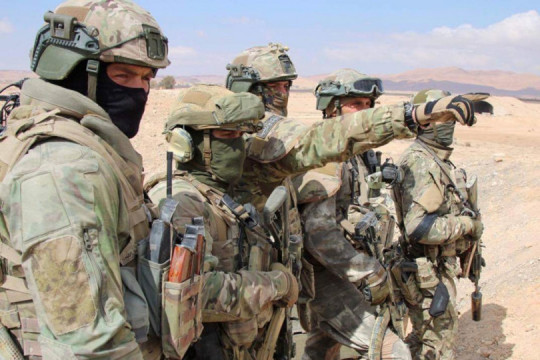
Russia Asymmetric
Today Russia is a key player in the politics of Europe, Africa and the Middle East. Its invasion and annexation of Georgia in 2008, was followed by a diplomatic and clandestine attempt to dissuade the colour revolutions of Eastern Europe. In 2013-14 Russia invaded and annexed Crimea and began to support separatists forces in the Donetsk Republic, Ukraine. In 2015, Russia officially intervened in the Syrian Civil War on behalf of President Bashar al-Assad, against Daesh and SDF forces. In 2019-20 Russia has become an influential party to the resurgence of the crisis in Libya.
In this series, “Russia Asymmetric” I hope to explore the Russian state’s use of asymmetric strategies and hostile measures against its percieved and potential adversaries in 2000-2020. I also wish to see what can be gained from such strategies when applied in the South Asian context. Military Warfare, Intelligence and Diplomatic Influence will be the three main axes.
один
Written by Siddharth Anil Nair.
0 notes
Text
Bromance Between Xi and Putin Grows as U.S. Spats Escalate
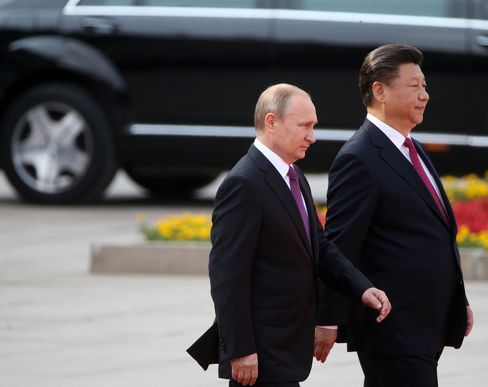
Chinese President Xi Jinping and his Russian counterpart, Vladimir Putin, will have more than vodka shots and gifts of ice cream to show for their warming relationship when they meet this weekend on the sidelines of a developing nations summit in India.
Recent months have seen greater security cooperation between Russia and China as they find common ground against the U.S. The neighboring giants last month held their first joint naval drill in the South China Sea and both have condemned U.S. plans to deploy a U.S. missile shield in South Korea. A Russian general said this week the military was working with China to counter an expansion of U.S. missile defenses, which they see as upsetting the balance between the three nuclear powers.
QuickTake Vladimir Putin
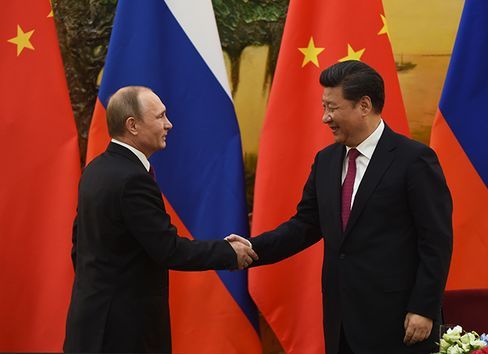
Vladimir Putin and Xi Jinping
Photographer: Greg Baker/AFP via Getty Images
The fact that both countries started to talk about joint actions on the military level is a very serious development, said Vasily Kashin, a senior fellow of Russian Academy of Sciences Far Eastern Studies Institute. The threat from U.S. missile defense pushes both China and Russia closer to each other. For Russia and China, the policy of containment is the containment of the U.S. first of all.
Missile Defense
The moves show how the rapport between Xi and Putin — as shown by frequent visits and personal gifts — has begun to foster more formal security ties. Their planned encounter on the sidelines of the BRICS summit in the Indian resort region of Goa would be their fourth this year and their 19th one-on-one meeting since Xi took power 2012. China saw a surge in Russian ice cream sales last month after Putin brought some for Xi, and Putin told Chinas state broadcaster they celebrated his birthday in 2013 by drinking vodka shots like two college students.
The development of those ties has coincided with a decline in both nations relations with Washington. Russia has provided powerful backing for Chinas efforts to challenge the U.S. longstanding security dominance in the Asian-Pacific region.
Lieutenant General Viktor Poznikhir, of the Russian Armed Forces General Staff, said computer command staff from the two countries conducted a missile-defense exercise this year to counter a successful deployment of a U.S. missile shield. We are working together on ways to minimize possible damage to the security of our countries, Poznikhir told a security forum in Beijing on Tuesday, adding another exercise was planned for next year.
Clinton Speech
Hillary Clinton said in a private speech in 2013 she warned Chinese officials while secretary of state the U.S. would ring China with missile defense if they didnt curb North Koreas nuclear weapons program, according to what appears to be an internal campaign document among hacked e-mails released by WikiLeaks last week.
The target of the attack, Clinton campaign chairman John Podesta, on Tuesday refused to confirm the veracity of the e-mails, saying the FBI was investigating the breach. Clintons aides have suggested that the e-mails might have been fabricated or doctored. They blame Russias government for the leaks, as does the U.S. government, while Russia has denied responsibility.
China meanwhile backed Russias failed United Nations resolution last weekend that wouldve urged a cease-fire without a halt to the bombing of Aleppo. It abstained from a competing French-drafted proposal that sought an end to air strikes and military flights over the besieged city.
Unique Relations
“We cannot choose our neighbors and this is a good thing, Putin said Wednesday in Moscow at a business forum. Over these last decades, we have developed quite unique relations of trust and mutual support.”
International security issues will feature when Xi and Putin meet, Chinese officials said at a briefing on Monday in Beijing. China and Russia hold the same position on the most important international and regional issues, including on Syria and Afghanistan, Vice Foreign Minister Li Baodong said.
Russia was Chinas largest supplier of foreign oil in August. That relationship has helped make China its top trading partner and provided an economic lifeline to Putin. A recovery in oil prices helped lift two-way trade by 3.6 percent year on the year in the first quarter, according to China Customs figures, after plunging 29 percent to $68 billion last year.
I definitely think this energized cooperation is significant, but fundamentally Russia and China will put their own interests first, said Sarah Lain, a research fellow at the London-based Royal United Services Institute who specializes in Russias ties to world powers. They will support each other on things that are of mutual interest, which is usually aimed at demonstrating an alternative power base to that of the U.S.
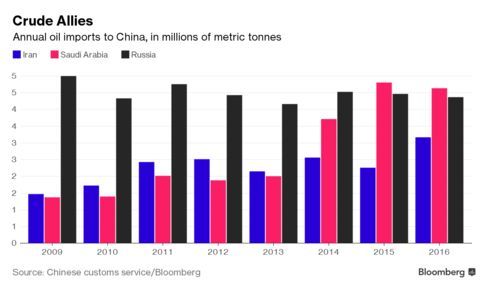
Building security ties with Russia requires Xi to revise Chinas longstanding opposition to foreign entanglements and comes as he boosts his countrys peacekeeping role in Africa and wades into Middle Eastern issues. China and Russia signed a joint statement during Putins visit to Beijing in June, pledging to strengthen global strategic stability.
What remains to be seen is whether China would be willing to give Russia greater support in areas where it has relatively few interests, such as Syria and Ukraine, and risk upsetting its Western trading partners. China deployed its first special envoy for the Syrian crisis in March and sent a delegation led by a senior military official there in August for talks with Syrian and Russian officials.
Zheng Yu, a senior researcher with the Chinese Academy of Social Sciences Institute of Russian, Eastern European and Central Asian studies, said the country would maintain a balanced approach toward Syria.
Weve told Russians that China is only a global economic power, but not a geopolitical superpower yet, Zheng said. We only selectively wade in on international hot-spot issues. The Middle East for China is still an unfamiliar battleground of global players.
from All Of Beer http://allofbeer.com/bromance-between-xi-and-putin-grows-as-u-s-spats-escalate/
0 notes
Text
The economic crisis in northeastern Syria:between challenges and prospects for possible solutions
Report summary.
This report examines the economic conditions in the regions of northeastern Syria (NES) in light of the geopolitical complications that the region is experiencing in general. The economic situation in all its aspects has become one of the most prominent challenges facing citizens in northeastern Syria, coinciding with the implementation of the Caesar Law, which, despite the exclusion of the regions of northeastern Syria, has left immediate economic effects after its implementation, which has made the situation worse.
In this context, TEVN held a virtual dialogue session via the Internet with a group of civil society organizations working in northeastern Syria, the Kurdistan Region of Iraq and the European Union countries, numbering 22 participating organizations with the aim of discussing the current economic situation. The meeting dealt with a set of axes related to economic reality, with the aim of finding solutions that help alleviate the burdens of economic conditions and identify the mechanisms, obstacles and challenges that everyone faces, from the burdens facing self-management to civil society.
This paper is based on the discussion of a set of basic pillars of the economic situation, which can be summarized as follows:
The general economic situation in northeastern Syria.
The effects and consequences of Caesar's Law.
Roles and responsibilities of self-management in north-eastern Syria.
The role of civil society organizations in alleviating the economic crisis.
The role of the international community, including the United Nations, in dealing with the economic crisis.
Based on the mentioned axes, a set of outputs and recommendations were reached that summarize and highlight the mechanisms and foundations that the actors can play to alleviate the economic crisis in northeastern Syria and prevent their exacerbation from the viewpoint of the organizations participating in the dialogue.
The economic situation in NE Syria.
The deterioration of the economic situation is due to a group of direct and indirect factors, as the protracted and ongoing Syrian war remains to this day the main reason for the collapse of the economy which has led to the destruction of infrastructure and the loss of the Syrian currency, the “ lira,” most importantly, in its purchasing power. Note the exchange rate to the US dollar: as this paper goes to press, the exchange rate is 2010 Syrian pounds to each US dollar.
And, according to opinions, this collapse led to a large imbalance in the purchasing power and a doubling of prices. In addition, there’s an imbalance in the purchasing value and the value of the salaries of the self-employed, who numbered about 250,000 in the region.
The participants also see that the war of liberation against ISIS has contributed to weakening the economy in NES in addition to the vast spending to eliminate the Islamic State. Moreover, the recent Turkish military operations that led to the crisis in the economy has also led to the collapse of the relative stability that was in the area, as the theft and looting operations carried out by the Syrian National Army factions, notably the agricultural wealth, have led to economic losses estimated in the millions, in addition to the displacement of more than 300,000 people.
The UN Security Council issued Resolution 2165 in 2014, which permits the introduction of humanitarian aid to Syria through four border points, two of which are in Turkey (Bab al-Salam and Bab al-Hawa), one via Jordan (the Ramtha crossing) and one via Iraq (the Al-Yarobia crossing). After several attempts to bypass the Russian-Chinese veto, on the evening of Saturday 11 July, a German-Belgian draft resolution was adopted which renewed the work of the humanitarian aid mechanism across the conflict lines and border crossings for one year. The UN resolution will allow the delivery of humanitarian aid to the residents of northwestern Syria through only one crossing, which is the Bab Al-Hawa crossing. In this way, the residents of the north-east and the south were denied access to emergency humanitarian aid, as the Russian-Chinese double veto contributed to the increase in the economic blockade of the region and depriving the population of aid access to them, especially after the advent of Covid-19.
The Coved Crisis-19 resulted in many citizens stopping their activities, especially the those dependent on their daily work and not on a fixed monthly income. This has contributed to an increase in the unemployment rate, accompanied by a significant increase in the prices of goods, food and medical supplies. These individuals have been severely affected by the quarantine imposed on the area, especially since no assistance was provided to the population.
There are other, indirect reasons that have contributed to the further deterioration of the living and economic conditions. For example, some believe that Kurdish self-management is incomplete and cannot establish large economic projects, nor able to establish direct commercial relations with neighboring countries and other countries with no direct assistance is provided to them. The political conflict between the Syrian government and Kurdish self-management in NES has affected the purchase of agricultural crops and the corruption in institutions in general has led to a large price imbalance. Others believe that the lack of sufficient synergy from civil society organizations working in the region to deal with the crisis has also contributed to reducing opportunities for economic advancement.
As for Caesar’s Law, it was classified according to the opinions discussed from the indirect causes in creating the economic crisis, but there is no doubt that it has contributed significantly to the exacerbation of the crisis through the devaluation of the Syrian currency against foreign currencies in addition to the rise in commodity prices and other consequences.
Should these afore-mentioned reasons and difficulties persist further, it may well lead to a catastrophic collapse of the economic situation, widespread poverty, increased unemployment, and the spread of diseases and psychological and social symptoms in the region.
The effects and consequences of Caesar's law on NE Syria.
Although Caesar's law was classified as one of the indirect causes of the deterioration of the value of the Syrian currency as mentioned earlier, and despite the statements of the United States of America that northeastern Syria is exempt from the penalties of Caesar's law, this law has left significant effects that caused the acceleration of the collapse of the Syrian currency and the rise of the price of goods.
Also a group of factors and conditions that preceded the law, such as the absence of large and strong projects, the absence of stability and the blockade imposed on NES as a result of the closure of border crossings, it is expected that the negative effects will increase over time with the absence of prospects for a political solution, and we may witness popular unrest.
Some participants believe that the consequences of Caesar's law will not be significant, as the law mainly targets armament and war machine tools. However, this does not seem to be the case, as there are several complex factors that may play a role with the implementation of Caesar's law. It will affect the amount of materials imported into the Syrian interior and restrict and reduce the amount of aid provided by civil organizations.
The groups most affected by this crisis are women and children due to the lack of good job opportunities for women, as well as the category of displaced people who do not own homes or any property that might be their source of income; those who live in the camps will also be greatly affected.
The role and responsibilities of self-administration in NE Syria.
Although Kurdish self-management does not have the great potential to cope with a crisis of this kind, and although it does not bear direct responsibility for the deteriorating economic situation, this does not deny that the greatest responsibility rests with it.
They are the holders of political and economic power, especially if we know that it is the one who monopolizes the management of the economy and also the political and social administration. There is a set of measures that no one can implement except the Kurdish self-management that would mitigate the economic effects on citizens.
Although the self-administration in NES has raised the salaries of its employees, there is still a big gap between the salary value in dollars and the level of prices and living rates per person in the northeast of Syria. Therefore, this increase must be reconsidered in a way that contributes to raising the per capita income and is not an ill-considered increase which must be accompanied by a set of other measures in order for the increase to have a greater positive impact.
The administration also has to change some administrative procedures. For example, self-management follows the system of joint leadership in senior positions, and this is unhelpful in several respects. This leads to greater bureaucracy and produces higher administrative and financial costs. Self-management should also control the supply committees, reduce merchants’ monopoly in commodity pricing, and combat corruption and favoritism in all institutions. It must also reduce customs taxes on transportation and crossings to reduce the prices of goods, in addition to setting up large projects that contain the region's needs to satisfy local requirements, which in turn will create more job opportunities, and it must support local production, especially in the agriculture. Additionally, there should be cooperation with civil society institutions so as to ease restrictions on project implementation, especially development. Also, we should not forget that civil society organizations, whether local or international, contribute to the introduction of large financing that would move the local economy and enhance the purchasing power. Also, the self-administration must find solutions to open the border crossings in order for aid to freely enter and establish strong trade relations with neighboring countries and major countries.
The role of civil society organizations in alleviating the economic crisis.
Without a doubt, civil organizations may play an effective role in facing economic conditions, reducing unemployment rates and raising the level of purchasing power, which lead to the revitalization of markets and commercial movement, Also, there should be effective response plans that target vulnerable groups such as women, youth, and people with special needs, and focus on setting up small and medium enterprises, to harness the capacities of the displaced within the camps in setting up projects that serve their living conditions, and to allow organizations to work to promote local initiatives and mobilize and advocate to appeal to donors in order to provide the necessary support for development projects. These may include livelihood programs and economic empowerment of women and youth and support sustainable development projects such as agriculture, livestock and industrial projects.
The focus should also be on strengthening governance within civil institutions, which would increase their effectiveness and provide an opportunity for all to be equal in employment.
The role of the international community, including the United Nations, in dealing with the economic crisis.
There is no doubt that the international community with all its bodies can play an active role in alleviating the consequences of Caesar’s law on the northeastern region of Syria and the economic crisis that the region is witnessing, through pressure on countries that hinder the arrival of humanitarian aid through border crossings (note above wherein Russia and China have used the right to veto, and hinder the opening of humanitarian crossings for the arrival of aid in the Syrian regions, in particular northeastern Syria). As to the necessity of opening the Al-Yarobia crossing, allowing freedom of movement, exchanging goods and facilitating the passage of humanitarian aid, this veto has impeded the efforts of international organizations in providing aid to the peoples of the region, which further aggravated the economic situation, which also coincided with the spread of Corona Covid-19. The international coalition must submit and establish economic projects that would reduce unemployment, provide jobs and revitalize the region. As for the camps where thousands of displaced people are living in stifling economic conditions, the United Nations should take effective steps towards providing food, health and social security.
Solutions and recommendations.
First, it is no secret that security and political stability will have significant implications for improving the economic situation, so it is the responsibility of the international coalition and the Security Council to continue to fight terrorism, restore stability and remove all foreign forces occupying parts of northeastern Syria, the continuation of the Kurdish-Kurdish dialogue and the inclusion of the rest of the components will contribute to the strengthening of political stability, which may constitute an initial step for a comprehensive solution in Syria in accordance with Resolution 2254.
Second, The Security Council should reach an agreement to reopen the Yarobia crossing in northeastern Syria and the Russian Federation and China should stop using its veto to nullify efforts to reopen the crossings, as millions of Syrians need urgent assistance. Russia and China's allies, the Syrian government, are unable to provide any assistance to their people, but they are the ones who increase their suffering and are the root cause of everything that happens to their people.
Third, Kurdish Self-administration should restart existing facilities and establish sustainable development projects such as sugar, rice, and oil factories, activate the mineral and pharmaceutical industries and associated retail businesses smoothly and must also provide general electric generators for cities and set a price that suits the citizens’ income. Generators are currently private, and their costs are high for the average citizen. It should restart the mills and all facilities that were suspended from operation as a result of the Syrian war. Finally, self-administration and civil society organizations are asked to join hands in order to rehabilitate medical centers, establish new medical points and provide them with the necessary equipment and tools, as well as provide the region with advanced equipment in anticipation of facing the Corona Virus Covid-19 situation.
Fourth, Local civil society organizations should increase coordination and enhance cooperation among themselves in order to unify their efforts to avoid crises, pressure and mobilize to cancel the veto (Russian-Chinese) decision and open border crossings to enable aid to enter the region, that there be strategic planning and governance, as well as focus on development projects, livelihood and empowerment.
Fifth, The United Nations bodies, the European Union and international organizations can greatly assist in providing several kinds of support for the projects and solutions mentioned in the third and fourth points above and be a factor in achieving economic and political stability, if there is political will.
For more information or to provide feedback and opinions, please contact TEVN via email.
also You can follow us on Twitter and Facebook . And subscribe to our newsletter to receive updates about the TEVN's work.
0 notes
Text
Headlines
Shooting at California food festival (Reuters) A gunman killed at least three people at a California food festival before being shot dead by police, and police were hunting for a second person they believed was involved in the killing. Some 15 people were wounded during the mass shooting at the three-day Gilroy Garlic Festival in northern California, some of them hurt in the crush of bystanders trying to flee, police said.
Trump says Coats is out as national intelligence director (AP) Dan Coats, director of national intelligence, is resigning after a turbulent two years in which he and President Donald Trump were often at odds over Russian interference in the 2016 election. Trump named a GOP congressman and fierce loyalist to replace him: Rep. John Ratcliffe, R-Texas.
That’s not a storm over Las Vegas. It’s a grasshopper invasion. (Washington Post) Grasshoppers are storming Las Vegas--and showing up like a rainstorm on weather radar. Radar footage from the National Weather Service shows two masses: a rainstorm north of Las Vegas and a host of living organisms above the city, Weather Service meteorologist Clay Morgan told The Washington Post. Unusually wet weather earlier this year has spurred the massive migration of grasshoppers stopping by Nevada’s biggest city on their way north, experts say.
Guatemala’s migrant pact with the U.S. threatens to unleash a political crisis (Washington Post) In pressuring Guatemala to accept a deal to absorb vast numbers of asylum seekers, the Trump administration has embarked on a dramatic and risky strategy to slash the number of Central Americans flooding the U.S. border. The accord--which was negotiated in secret and signed at the White House on Friday--could plunge Guatemala’s young democracy into a constitutional crisis, analysts warn. It could also saddle one of the hemisphere’s poorest countries with tens of thousands of Salvadoran and Honduran migrants who would be barred from making their claims in the United States. But the agreement is built on a fragile political and legal base. The Guatemalan Constitutional Court ruled earlier this month that President Jimmy Morales needed approval from the Guatemalan Congress to sign the accord, something he has not received.
Mass decapitations as at least 52 killed in Brazil prison riot (Reuters) At least 52 inmates died, with 16 decapitated, in a prison riot on Monday in the northern Brazilian state of Para, the state’s prison authority said, underlining the struggle Brazil’s far-right government faces to restore order in the country’s jails.
UK PM Johnson’s No-Deal Brexit Gamble Hammers Sterling (Reuters) The British pound tumbled on Tuesday as investors bet Prime Minister Boris Johnson’s Brexit brinkmanship with the European Union could trigger a messy divorce that would sow chaos through the world economy and financial markets.
Huawei Says Sales Up 23% This Year Despite US Controls (AP) Huawei’s sales grew by double digits in the first half of this year despite being placed on a U.S. security blacklist and its chairman said Tuesday that Washington’s campaign against the Chinese tech giant has “galvanized our people.”
Hong Kong protests ramp up as China arrests dozens and slams Western support of “violent crimes” (CBS News) China’s central government condemned ongoing protests in Hong Kong on Monday, following another weekend of unrest. Protesters clashed with riot police on Saturday and Sunday, leading to more than 60 arrests. Government officials say the violence has caused serious damage to the semi-autonomous city’s international image, rule of law, and the lives of residents. CBS News correspondent Ramy Inocencio, who has been covering the protests for two months, said Monday was the first time China’s central government held a press conference on affairs in Hong Kong since the city returned to Chinese rule in 1997. Beijing condemned the violent protests, and urged calm.
Hong Kong Protesters Disrupt Train Services, Cause Commuter Chaos (Reuters) Hundreds of Hong Kong protesters blocked train services during the early morning rush hour on Tuesday, causing commuter chaos in the latest anti-government campaign to roil the former British colony.
New Zealand’s Indigenous Maori Protest Over ‘Stolen Children’ (Reuters) Thousands of Maori people protested across New Zealand on Tuesday calling for an end to the practice of taking at-risk children away from their families, as tensions grow between the indigenous community and the government.
U.N. Says Almost 4,000 Afghans Killed or Wounded in First Half of 2019 (Reuters) At least 3,812 Afghan civilians were killed or wounded in the first half of 2019 in the war against militant groups, including a big increase in the number of casualties caused by government and NATO-led troops, the United Nations said on Tuesday.
Trump Wants Forces Reduced in Afghanistan by Next U.S. Election: Pompeo (Reuters) U.S. President Donald Trump wants combat forces reduced in Afghanistan by the next U.S. presidential election, Secretary of State Mike Pompeo said on Monday, in comments that underlined the growing pressure from Washington to cut troop numbers there.
Renewed unrest grips Bahrain after authorities execute activists (Reuters) Protests broke out in Bahrain after the execution of two Shi’ite Muslim activists on terrorism-related charges revived tension over the weekend in the Sunni-led kingdom, a Western ally that has cracked down on dissent since a failed 2011 uprising.
Royal Navy escort (Foreign Policy) A second Royal Navy warship, the HMS Duncan, arrived in the Persian Gulf over the weekend, joining the frigate HMS Montrose in a mission to protect Brittish ships transiting the Strait of Hormuz, amid escalating tensions between Britain and Iran. The news suggests Britain is charging ahead with a plan to protect its own vessels after Iran seized the British-flagged Stena Impero last week, as the West struggles to hash out how to better secure the Strait.
Rebels Say Russia-Led Raids Target Cities in Syria Northwest (Reuters) Syrian rebel commanders and rights groups said on Monday Russia and its Syrian ally are stepping up aerial strikes on heavily populated cities, in a new and bloodier phase of a three-month-old assault on the last opposition bastion in the northwest.
Israel invests in high-tech upgrades at West Bank crossings (AP) It’s just after 6 a.m. and a Palestinian man’s face is momentarily bathed in crimson light, not by the sun rising over the mountains of Jordan, but by a facial recognition scanner at an Israeli checkpoint near Jerusalem. The Israeli military has installed the face scanners as part a multimillion dollar upgrade of the Qalandia crossing that now allows Palestinians from the West Bank with work permits to zip through with relative ease. But while the high-tech upgrades may have eased entry for Palestinians going to Israel for work, critics say they are a sign of the ossification of Israel’s 52-year occupation of the West Bank and slam the military’s use of facial recognition technology as problematic.
3 notes
·
View notes
Link
By this point in his presidency, George H. W. Bush was preparing for battle with Iraq, Bill Clinton had begun bombing Serb targets in the former Yugoslavia, George W. Bush had invaded Afghanistan, and Barack Obama was about to encounter the Arab Spring.
Donald Trump, by contrast, has been lucky.
That is the conclusion of a report released Monday by the Council on Foreign Relations ranking the conflicts that could most threaten the United States in the coming year. The study notes that the Trump administration “has yet to confront a serious international crisis in which the president has had to wrestle with the agonizing decision over whether to commit the United States to a new and potentially costly military intervention.”
“It is reasonable,” the report’s authors write, “to assume that it is only a matter of time before the Trump administration will face its first major crisis.”
Here are some of the study’s most striking conclusions:
Fortune Has Favored Trump
Paul Stares, who oversees CFR’s annual survey, acknowledged that Trump has faced some grave security challenges. Bashar al-Assad, for example, used chemical weapons multiple times against the Syrian people, while North Korea tested its most powerful nuclear device ever and ballistic missiles that for the first time could reach the United States.
But Stares noted that the president didn’t appear to seriously consider countering Assad’s atrocities with anything beyond limited air strikes and that while Trump’s bellicose rhetoric toward North Korea last year contributed to an atmosphere of crisis, it’s not clear he was really on the verge of taking military action. (Nikki Haley, the outgoing U.S. ambassador to the United Nations, who was instrumental in executing the administration’s “maximum pressure” campaign against North Korea, recently told me that the president wasn’t planning to “instigate something” despite his bluster, but that he “totally would have” gone to war had Kim “launched something” that came “near the U.S.”)
Developments that might well trigger a substantial U.S. military response, like a large-scale attack on American citizens or Russian aggression against a European NATO ally, haven’t materialized, Stares pointed out. And the one time Trump deployed U.S. troops on a new military operation, it was to the border with Mexico to deter a migrant caravan ahead of the midterm elections—a move his critics dismissed as a political stunt.
The president has used force sparingly in part because he doesn’t share his predecessors’ expansive view of the United States as the guarantor of global stability. But, as Stares told me, “you could say he’s just been lucky, too.”
The CFR survey, in which about 500 American government officials and foreign-policy experts estimated the likelihood and impact on U.S. interests of 30 hypothetical incidents in 2019, points to a range of places where the luck could run out.
Great-Power Conflict Is More Cold Than Hot—for Now
In and outside the U.S. government, there’s a lot of talk about how fierce competition is getting between the world’s great powers, whether in the form of Russia interfering in the 2016 U.S. presidential election or the United States waging a trade war with China. But the participants in CFR’s poll didn’t seem especially concerned about such political and economic skirmishes turning hot.
[Read: The Trump administration debates a cold war with China]
Only one contingency directly involving China or Russia—an armed conflict between China and one of America’s regional partners over disputed territory in the South China Sea—appeared in the report’s top tier of risks. That category includes situations judged either highly likely to occur next year or liable to inflict a high level of damage on U.S. interests.
Other scenarios might implicate the United States’ geopolitical rivals. One of the highest-ranked risks in the report—eclipsing a major act of terrorism against the U.S. homeland or an ally—was a cyberattack on U.S. critical infrastructure and networks, which might be carried out by a sophisticated state actor such as China or Russia. The Assad government’s violent reassertion of control in Syria, which respondents deemed very likely to happen, could place Washington and Moscow at odds.
Nevertheless, a high-impact, low-probability event does appear in the study for the first time in its 11-year history: a crisis between the United States and China over Taiwan ahead of the 2020 election on the island, which has friendly (unofficial) relations with the U.S. but which Beijing claims as its sovereign territory. While Trump briefly inflamed tensions as president-elect by taking a phone call from Taiwan’s leader, the dispute hasn’t reached crisis level since the Clinton administration, when China fired missiles into the waters surrounding the island.
If some aspect of Xi Jinping’s mounting-pressure campaign against Taiwan was to provoke the Trump administration, Chinese leaders might take actions “because they feel so strongly about Taiwan as part of China, and [their U.S. counterparts might] do things because this is now the real test of wills with China, and our credibility is on the line, and the future of the 21st century will hinge on how this particular crisis plays out,” Stares said.
We’re Not Out of the Woods on North Korea
Respondents were not as anxious as they were last year about a military conflict between North Korea and the United States. (In the wake of Trump’s withdrawal from the Iran nuclear deal, they remain just as alarmed about a military conflict erupting between Iran and the U.S. or one of its regional allies.) Still, the return of tensions on the Korean peninsula following the collapse of nuclear talks did emerge as a high-priority risk.
[Read: The beginning of the end of the Korean War]
The survey results indicate that “people don’t frankly believe Trump has solved this issue or that North Korea really is on the path to denuclearization, and that [they believe] it won’t take much for it to be reignited as a major flashpoint,” Stares observed. The respondents “more or less put it as an even chance that this thing is going to unravel.”
Trouble’s Afoot in the Americas
Though possible conflicts in the Middle East and North Africa are most prevalent in the report, the latest survey featured more scenarios in Latin America than in any prior year, including a worsening economic crisis and political instability in Venezuela (a top-tier concern) and violence and turmoil in Nicaragua. Some respondents also wrote in the prospect of civil unrest in Brazil, which just elected the far-right politician Jair Bolsonaro.
[Read: Can Brazil’s democracy withstand Jair Bolsonaro?]
It’s a reminder that even as the United States tends to troubles at home, it is navigating a neighborhood and a wider world in great flux.
from The Atlantic https://ift.tt/2Eqt9Ab
0 notes
Text
A gruesome murder bares world powers’ flawed policies
By James M. Dorsey
A podcast version of this story is available on Soundcloud, Stitcher, TuneIn and Tumblr.
Saudi journalist Jamal Khashoggi’s gruesome murder raises fundamental questions that go far beyond Middle Eastern geopolitics.
They go to the risks of support for autocratic regimes by democratic and authoritarian world powers, the rise of illiberal democracy in the West, increasing authoritarianism in Russia, and absolute power in China in which checks and balances are weakened or non-existent.
Mr. Khashoggi’s killing is but the latest incident of hubris that stems from the abandonment of notions of civility, tolerance and plurality; and the ability of leaders to get away with murder, literally and figuratively. It also is the product of political systems with no provisions to ensure that the power of men like Saudi Crown Prince Mohammed Bin Salman is restrained and checked.
Mr. Khashoggi was an advocate of the necessary checks and balances.
In his last column published in The Washington Post posthumously, Mr. Khashoggi argued that “the Arab world needs a modern version of the old transnational media so citizens can be informed about global events. More important, we need to provide a platform for Arab voices. We suffer from poverty, mismanagement and poor education. Through the creation of an independent international forum, isolated from the influence of nationalist governments spreading hate through propaganda, ordinary people in the Arab world would be able to address the structural problems their societies face.”
Mr. Khashoggi’s words were echoed by prominent journalist and political analyst Rami Khouri. “We are heading to the law of the jungle if big power and Mideast state autocracy is not held accountable,” Mr. Khouri said.
In a similar vein, a survey by the Arab Barometer survey concluded that public institutions in the Arab world, including the judiciary enjoyed little, if any, public trust.
“Part of the lack of trust comes from the disenfranchisement felt by many, especially youth and women… The lack of alternative political forces is adding to the fatigue and lack of trust in institutions. Citizens in the region struggle to find an alternative to the ruling elite that might help address the issues of ineffective governance and corruption,” said a report by the Carnegie for Endowment of Peace.
“Citizens are increasingly turning toward informal mechanisms such as protests and boycotts, and focusing more on specific issues of governance, such as service provision, particularly at the local level. Furthermore, with democracy under threat across the globe, calls for broad democratic reform have been replaced by more basic demands,” the report went on to say.
What puts the price Mr. Khashoggi paid for advocating controls of absolute power in a class of its own, is the brutality of his killing, the fact that he was murdered in the Saudi consulate in Istanbul rather than, for example, by an unknown killer on a motorbike; and the increasingly difficult effort to resolve politically the crisis his death sparked.
Beyond the support by world powers of often brutal autocrats facilitated by a lack of checks and balances that in the past three decades has destroyed countries and costs the lives of millions, Mr. Khashoggi’s murder is also the product of the failure of Western leaders to seriously address the breakdown in confidence in leadership and political systems at home and abroad.
The breakdown peaked with the 2011 popular Arab revolts; simultaneous widespread protests in Latin America, the United States and Europe; and the increased popularity of anti-system, nationalist and populist politicians on both the right and the left.
Mr. Khashoggi joins the victims of extrajudicial poisoning in Britain by Russian operatives of people who like him may have been a thorn in the side of their leaders but did not pose an existential threat – not that that would justify murder or attempted murder.
He also joins the millions of casualties of failed policy and hubris caused by Iraqi leader Saddam Hussein’s gassing of Kurds in the 1980s and reckless 1990 invasion of Kuwait, support for Syrian president Bashar al-Assad’s determination to cling to power irrespective of the human cost, the Saudi-UAE-led war in Yemen that has produced the worst humanitarian crisis since World War Two, and China’s attempt to brainwash and socially engineer what the country’s leaders see as the model Chinese citizen.
And those are just some of the most egregious instances.
No better are the multiple ways in which autocratic leaders try to ensure conformity not only through repression and suppression of a free press but also, for example, by deciding who deserves citizenship based upon whether they like their political, economic or social views rather than on birth right.
Take Bahrain whose minority Sunni Muslim regime has stripped hundreds of its nationals of their citizenship simply because it did not like their views or Turkey with its mass arrests of anyone critical of the government.
The irony is that if elections in democracies are producing illiberal leaders like US President Donald J. Trump, Turkey’s Recep Tayyip Erdogan and Hungary’s Victor Orban, in Asia and Africa they are bring forth governments mandated to reverse Belt and Road-related, Chinese funding of projects that primarily benefit China rather than the recipient economically and pave the way for greater Chinese influencing of domestic politics as well as the export of systems that enhance unchecked state power.
In some cases, like Malaysia, they produce leaders willing to take on China’s creation of a 21st century Orwellian surveillance state in its north-western province of Xinjiang.
It matters little what label world powers put on their support for autocrats and illiberals. The United States has long justified its policy with the need for regional stability in the greater Middle East. Russia calls it international legality while China packages is it as non-interference in the domestic affairs of others.
Said Middle East expert and former US official Charles Kestenbaum building on Mr. Khashoggi’s words: “If they (Middle Eastern states) want to compete with the globe in IT (information technology) and tech more broadly, they must encourage risk, innovation and freedom to fail. Such social and political freedom does not exist adequately in the region. The opposite in fact, authoritarian regimes repress such initiative and openness. So what do they have to compete and globally engage in the 2020’s? Nothing.”
Dr. James M. Dorsey is a senior fellow at the S. Rajaratnam School of International Studies, co-director of the University of Würzburg’s Institute for Fan Culture, and co-host of the New Books in Middle Eastern Studies podcast. James is the author of The Turbulent World of Middle East Soccer blog, a book with the same title and a co-authored volume, Comparative Political Transitions between Southeast Asia and the Middle East and North Africa as well as Shifting Sands, Essays on Sports and Politics in the Middle East and North Africa and just published China and the Middle East: Venturing into the Maelstrom
0 notes
Text
What Does Motivate Chinese Help Offer to Syria’s Idlib Operation?
New post https://is.gd/WnAWuR
Since the eruption of devastating crisis in Syria, various international and regional powers vied for influencing the course of developments in the West Asian country, turning the conflict into one of the most complicated issues of the 21st century.
The US and Russia are the key powers racing to hold a sway in the conflict, while some other parties are also seeking a similar role in the future developments of the country in coordination with each of the two key players. China is one of the emerging powers which as the crisis draws to an end shows a willingness to join the negotiation process between the government and the opponents and even the battlegrounds in favor of the Syrian army which is bracing for the recapture of the northwestern city of Idlib, last main stronghold controlled by foreign-backed militants.
On Saturday, the Chinese Ambassador to Syria Qi Qianjin suggested Beijing could soon deploy forces to assist the Syrian army in its upcoming Idlib offensive against militants, in addition to anti-terrorist operations in other parts of the country. Speaking to Syria’s Al-Watan newspaper on Thursday, the Chinese diplomat said they are monitoring the conflict, adding that the Chinese military “is willing to participate in some way alongside the Syrian Army that is fighting the terrorists in Idlib and in any other part of Syria,” the Russian Sputnik news agency has reported.
Meanwhile, Chinese military attaché Wong Roy Chang told the Al-Watan newspaper there is “ongoing” military cooperation between the two countries and said China wishes to advance its relationship with the Syrian Armed Forces, Sputnik maintained.
Last week, the Syrian Arab Army announced liberation the city of Daraa in the south, which was held by the anti-government militants for four years. The army said it will immediately launch an offensive to retake Idlib from the militants, which was under their control since the conflict sparked in 2011. The analysts expect Syria to enter a new stage of reconstruction once the city is restored to the control of the legitimate administration.
China presence in Syria Beijing is one of the key allies to the Syrian government. Later last year, the Chinese administration announced the intention to send two special forces units, dubbed “Siberian Tigers” and “Night Tigers”, to the Syrian battlefields to assist the Syrian government forces in their operations against ISIS terrorist group in the country’s east.
Before that in 2015, the Syrian government issued an authorization for 5,000 Chinese troops to enter the country. Reports suggested that Beijing stationed its forces in southern Lattakia port city in the northwest. At the time, the Chinese ministry of defense stated that military advisors along with combat forces and air and navy equipment were deployed to the war-hit country.
But China’s role is not restricted to the combat grounds. China, one of five powers with veto leverage at the United Nations Security Council, over the past six years tried to check the US-led West’s anti-Syrian resolutions and efforts at the UNSC in association with Russia.
Only in 2013, the US pressed for three resolutions at the UNSC, which sought to limit the access of the Syrian government to arms for fighting the terrorists across the country, were vetoed by China and Russia. To date, the Chinese and Russian governments have maintained their diplomatic, alongside military, backing to Damascus against the various Western intervention moves.
Legitimizing presence beside Russia Expressing the interest to take part in upcoming Idlib assault against the terrorists from one aspect looks to be motivated by Beijing’s predictions about the future of field developments in the country. Now the Syrian army, aided by Russia, is getting ready to launch a major liberation operation in Idlib. Having in mind that the Western governments and media launched a propaganda campaign against Damascus each time the Syrian government was ready to make a major advance against the terrorists— for instance, in Aleppo or the south and Eastern Ghouta in the capital’s suburbs—, this time they will predictably do the same job in relation to Idlib operation. China coming on board in favor of the central government can tangibly ease the media and diplomatic pressures on the campaign, a situation that will shore up Idlib liberation international legitimacy.
China and Russia’s past cooperation at the UNSC marked the coalition between the two heavyweights in support of the Syrian government. Now, this alliance is expanding to cover the ground developments and Idlib operation.
Currently, vast tracts of Idlib territory is held by factions of al-Nusra Front, the Syrian branch of Al-Qaeda which is widely blacklisted as a terrorist group. The blacklisting is expected to buy considerable international validity to the possible involvement of China and Russia militarily in favor of Damascus campaign.
Prelude to involvement in reconstruction Looking at the case from another dimension, the Chinese help offer to the Syrian administration can be seen as an effort to build a prelude to engage in the reconstruction of the conflict-hit nation. Beijing’s strategy has always revolved around the securing its economic interests using diplomacy and closeness to the countries. This strategy helped the Chinese leaders to gain sway in various parts of the world in a fierce competition against the US.
The welcomed Chinese entry to Syria’s rehabilitation becomes significant against the uninvited entry of the US and other adversaries to the Syrian government to the rebuilding efforts. Once the US and other allies are cut from the list, other pro-Damascus actors, including Beijing, will find it a great opportunity to play a role in a post-war Syria.
For the Chinese leaders, participation in Syria’s rebuilding will help with stronger presence and coalitions in the Levant and West Asia regions. This prospect is what encouraging China to join the prospective Syria rehabilitation projects.
Beijing flexes muscles to Washington China’s presence in Syria in the form of military involvement in the Idlib or engagement in reconstruction process is aimed at, beside gaining a toehold, flexing the muscles for the rival US. West Asia, with its geopolitical position and being home to huge energy reserves that make it economically attractive, is one of the world’s key competition fields for the great powers. China strategically needs to expand its foothold in the region to unseat the US as an economic superpower. Moreover, amid intensifying trade war between the US and China, Beijing in response seeks to squeeze Washington in other areas, including Syria.
– Islam Times
0 notes
Text
Check out New Post published on Ọmọ Oòduà
New Post has been published on http://ooduarere.com/news-from-nigeria/world-news/russians-flabbergasted/
The Russians Are Flabbergasted
by Israel Shamir (cross-posted with the Unz Review by special agreement with the author)
President Trump is so pissed off by the Stormy affair that he is likely to prefer a good old war to another humiliation. This suits his enemies and friends (though not his voters) to a tee. He has a choice of doing a difficult manly act that needs all his courage, but which one? Should he put the well-being of his country at stake and brave Russian missiles, or risk the displeasure of the elites and sack Mueller? He is tempted to do the easy thing. Thus he has been maneuvered into deep waters by a powerful coalition of Brits and Jews, the same people who delivered you the last two world wars.
His attempt to make sense and drop the Syrian hot potato (“I strongly wish for the withdrawal of our forces from Syria”, he tweeted) has been rebuffed by the indomitable Mr Netanyahu. Don’t even think of doing it, the big man from Tel Aviv said to Donny in the tense telephone conversation. Don’t leave Syria, you still have to fight the Iranians and Russians. And don’t forget the Syrian kiddies, added the man still covered with the gore of 2,500 Palestinians shot on his orders last week. The Pentagon and US intelligence agencies take their orders directly from Tel Aviv, or via AIPAC; they are already preparing for an extended stay in Syria, despite Donny’s declarations.
The Jews went ballistic when they heard of Trump’s intention to leave Syria. The scribes of WaPo and NY Times condemned the step as playing into Russian hands. “Washington Post columnist and CNN commentator Catherine Rampell said that “Putin must be ecstatic” with Trump’s instructions to begin planning for withdrawal from the region. Forget the fact that it’d be odd for a president to base all of his foreign policy decisions on what would bother Russia — why isn’t Rampell focusing on how delightful it must be for American soldiers to finally reunite with their families, or how the resources this country has spent overseas can now be used domestically?”, – noted a media reporter. This was the cue for Mueller’s raid of Cohen’s office. The old fool has to be pushed, if he does not want to go by his own will, they decided.
America with its Puritan background is the only country where sexual mores are so strict that they lead to war. Clinton went to war in Yugoslavia because of a blow job, while Trump will possibly destroy the world because of a one-night stand.
An attack on Syria is likely to bring a Russian response. At the least, it will be a local conflagration, a joust, a trial of forces and wills. Who knows how it will end? This was been postponed in 2013, when the US armada sailed to Syria’s shores to avenge some other alleged chemical attack. I wrote about that fateful encounter, perhaps over-optimistically, in a piece called The Cape of Good Hope.
“It was touch and go, just as risky as the Cuban missile crisis of 1962. The chances for total war were high, as the steely wills of America and Eurasia had crossed in the Eastern Mediterranean. The most dramatic event of September 2013 was the high-noon stand-off near the Levantine shore, with five US destroyers pointing their Tomahawks towards Damascus and facing them – the Russian flotilla of eleven ships led by the carrier-killer missile cruiser Moskva and supported by Chinese warships. Apparently, two missiles were launched towards the Syrian coast, and both failed to reach their destination. (We shall return to these two missiles later).
After this strange incident, the pending shoot-out did not commence, as President Obama stood down and holstered his guns. This was preceded by an unexpected vote in the British Parliament. This venerable body declined the honour of joining the attack proposed by the US. This was the first time in two hundred years that the British parliament voted down a sensible proposition to start a war; usually the Brits can’t resist the temptation. This misadventure put paid to American hegemony , supremacy and exceptionalism. Manifest Destiny was over.”
As we see now, the high noon was been postponed by five years, and now it is being re-run. The British Prime Minister Theresa May decided she does not need parliament’s approval, President Trump decided he does not need an approval of Congress. So these brakes had been removed.
And now back to those two missiles of 2013. They were sent by the Israelis, whether they were trying to jump-start the shoot-out or just observed the clouds, as they claim. The missiles never reached its destination, shot down by the Russian ship-based sea-to-air defence system, or perhaps rendered useless by Russian GPS jammers.
Fast forward to 2018. On the night of April 10, in the small hours, the Syrian air field T-4 had been attacked by eight air-to-ground missiles; five were downed by the Syrian defence, three (or two) reached their goal and killed a few personnel. For a while, it was thought this was the American attack, but rather quickly, “Russia outed Israel”, as Haaretz reported. Israel tried to dissimulate, at first claiming they warned Putin and got his okay. When Putin’s spokesman denied that, they said they did it by the US request. Most probably they again tried to bring the confrontation to the fore.
Now, with the US Navy in place, with the support of England and France, the countdown to a confrontation has apparently started. The Russians are grimly preparing for the battle, whether a local one or the global one, and they expect it to begin any moment.
The road to this High Noon had led through the Scripal Affair, the diplomats’ expulsion and the Syrian battle for Eastern Ghouta, with an important side show provided by Israeli shenanigans.
The diplomats’ expulsion flabbergasted the Russians. For days they went around scratching their heads and looking for an answer: what do they want from us? What is the bottom line? Too many events that make little sense separately. Why did the US administration expel 60 Russian diplomats? Do they want to cut off diplomatic relations, or is it a first step to an attempt to remove Russia from the Security Council, or to cancel its veto rights? Does it mean the US has given up on diplomacy? (The answer “it’s war” didn’t come to their minds at that time).
The astonished Russians responded all right. They also expelled 60 diplomats, and they made it painful: all US diplomats engaged in the political department of the Moscow Embassy were on the non-grata list. The Political department consisted of three sections, dealing with foreign policy, internal Russian politics and military analysis; the most important centre of data collection, of liaison with Russian politicians, of military consequences, of Syria and Ukraine, of North Korea and China, experienced first-class intelligence officers and field hands – all gone, including their Political Officer Christopher Robinson (POL).
The Russians expelled Maria Olson, the Embassy’s well-known spokesperson, and the Ambassador’s interpreter. They closed down St Petersburg Consulate, an important centre for connecting, influencing and interacting with the opposition in this ‘second capital’ of Russia. The US has lost many of its Moscow hands, people who knew Russia and had developed personal relations with important Russians. It will take a lot of time and effort for the US State Department and intelligence agencies to get back to the positions they had lost. The Brits who initiated the deportations also lost about fifty of their Moscow Embassy staff.
Surprisingly, the mass deportation of so many Russian diplomats had little effect on the Russian people, as this strike had been neutralised by another painful event, by the Kemerovo Mall blaze killing 64 cinema-goers including over 40 children. The blaze, even if it weren’t arson (it has not been proven yet) had triggered a massive onslaught of fake news and internet trolls on the people of Russia. A million underfed Ukrainians were deployed by the Western psywar on the web to tell the Russians that hundreds of their children had been incinerated, and that their authorities lie to them. This operation revealed the level of influence and integration the Western spy agencies have in Russia.
Kemerovo was a good choice for the operation: it is the only ethnic-Russian region ruled by an old-style local hero who had outlived his wits, the only region that reported indecently (and unrealistically) high support for Putin in the recent elections, a depressive region of mines and miners with a big potential for trouble.
Putin managed it rather well by coming personally and dealing with the situation hands on. He learned the ropes since 2000, when, at the dawn of his first presidential term, the Kursk submarine went down with all hands. Putin stayed away from the sailors’ families, and acted callous, people said. “It had sunk”, Putin replied to the question “What happened to Kursk?” (It is said USS Memphis had fired a torpedo at the submarine, causing the disaster, while the new president had been reluctant to aggravate relations with Clinton Administration). Now, in 2018, he was very good, full of empathy and consideration, conveying strength and decisiveness.
Whatever American agency carried out the psyop around Kemerovo, it was very successful, but its success undermined another operation, that of the Russian diplomats’ expulsion. The Russians did not pay it sufficient attention.
The alleged reason for the expulsion, the poisoning of Sergey Skripal and his daughter, made very little sense. Even if the old spy were bumped off by his erstwhile employers, such a reaction would be excessive by all means. He was not a Napoleon (poisoned by the Brits 200 years ago), not a prince of blood, not a great inventor nor a successful spy. He was a retired ex-spy, a wash-out. Anyway he didn’t die, he was just sick for a while. Perhaps he ate something in the pub that didn’t agree with him. This is the opinion of his niece, Victoria, who is the only person alive who had been in contact with the Skripals since their alleged hospitalisation.
This affair is so obscure that it beats Rashomon anytime. Russian reporters went around Salisbury and noticed many incongruences. It is not certain whether Skripals were poisoned at all, and where they are. Their pets survived the deadly poison, and they had to be destroyed. This piece of black Russian humour had been forwarded a lot around the net:
Skripal had been poisoned by a most powerful poison, 2 grams will kill half a country instantly! The Russians
– poisoned him in the restaurant – no, on the bench – no, in the car – No, the door handle was smeared – No, the suitcase was poisoned – No, everything in the house was poisoned. – Oh, and buckwheat was poisoned, – but they did not die instantly, but walked around somewhere for four hours, – but the policeman that discovered them almost died on the spot, – but the poison was instantly identified, – an antidote was instantly introduced, and Skripals and the policeman were saved; – The policeman had been discharged next day! – But they were in coma, and they will never recover! – but no, the daughter had recovered fast! – Oh, and dad is revived … a miracle! – and they both are quickly recovering, your strongest poison is useless. – the restaurant had been surrounded by police in spacesuits – the park had been surrounded by police in spacesuits – the house had surrounded by police in spacesuits – they are in spacesuits, since the poison is deadly dangerous, but next to them are policemen without protection … – The bench was cut down and removed: it’s such a terrible poison that the bench retained its toxic quality for two weeks; – but the cat had survived in the poisoned house … the policeman had touched Skripal and nearly died, and the cat survived … and the guinea pigs would survive, but they were all forgotten, and died of hunger in the house; – and their remains were immediately burned, as they are poisoned by the strongest poison; – For two weeks they were poisoned by the strongest poison and survived, and now they had to be urgently cremated; – Only guinea pigs died, the cat survived all this poison. It was stressful and hungry, so they killed it and cremated to make it certain nobody will find the secret etc etc.
The true hero of Skripal saga is the British ex-Ambassador Craig Murray, who followed the developments and unveiled many of its inconsistencies and outright lies. You may read his articles and twits to learn the details.
Julia Skripal took a daring step: she called her cousin Viktoria in Moscow. Their conversation is an amazing document. Julia says that she and her father are in good health; she doubts Viktoria will be allowed to visit her. Indeed, the British government refused to grant her visa. The feeling is that Julia is imprisoned.
I spoke with a retired Russian counter-intelligence officer who is familiar with the subject. He told me Russia never had a Novichok toxic substance: this name was given by counter-intelligence to A-232 in order to trace the leaks. It worked: a man called Vil Mirzayanov, an administrator in the chemical labs, leaked the Novichok story, and thus he was apprehended and arrested. A-232 had been produced in small amounts in 1990s, and some of it could be stolen and sold in these horrible years, when a full colonel of Russian intelligence had to moonlight as a taxi driver to supplement his measly $46 monthly salary. In those years, the poison could be indeed made available, and in one case it was used by criminals.
Theoretically it is not impossible that some of this poison could have been saved and stored by some criminals; alternatively, it was available to the Americans who dismantled the labs in 1992. Anyway we have no independent proof that Skripals were poisoned by anything at all. If they survive, if the British and the American intelligence services don’t kill them, perhaps we shall know more. We can definitely exclude the possibility that Russian state agents would go to Britain to poison an old spy who had been pardoned by Russian president years ago. Even if he was active in producing Christopher Steele’s Trump (“Golden Rain”) file, the Russians would have no compelling reason to kill him at all, and in such an odd way in particular. “If we would kill him, he would stay killed”, concluded my interlocutor.
The details of Skripal case are very entertaining, but not necessary for our understanding. The case was used to install in minds the connection between chemical poisoning and Russia. It is unfair, for Russians destroyed all their chemical poisons under the eyes of Organisation for the Prohibition of Chemical Weapons (OPCW) inspectors, but life is often unfair.
The connection between chemical poisoning and Russia had been prepared for the forthcoming event. Eastern Ghouta was an important and well entrenched location of the Syrian rebels. Being within easy reach from Central Damascus, it provided the rebels with a chance to seize power in the Syrian capital. As the Syrian army with Iranian and Russian support advanced into Eastern Ghouta, they learned of the rebel plans to stage a false flag chemical weapon attack, as they already had done a few times in past. President Putin warned of such a possibility at his joint (with President Erdogan and President Rouhani) press conference in Ankara last week, a few days before the alleged attack.
The attack had never occurred at all, but it was duly reported by the pro-Western media. Thus the game came to a close. Skripal Affair established the connection of Russia and chemical weapons, Eastern Ghouta allowed to use this connection in order to attack Russia.
We should not overestimate importance of these media events. The leading Western powers and their media refused to consider different explanations, refused an open inquiry, they went for jugular. Russia has been demonised in 2018, like Germany was demonised in 1940. It was a long and cautious labour. Have a look at this site theday.co.uk – it is a site for school children and their teachers. You’ll be amazed to discover its fervent hatred of Russia and Putin being pumped into hearts and heads of young generation. Such a long planning can’t be dependent on an event like poisoning of an ex-spy or even on the fall of a Syrian underground fortress.
The planners of a war on Russia have utilised fear of anti-Semitism for their purposes. I called this method Anti-semitism Weaponised. Jeremy Corbyn, the Labour leader, has been blocked and contained by accusations of anti-Semitism. He was the only leader able to stop Britain’s descent into war with Russia. Other Labour MPs and activists have been attacked over alleged anti-Semitism issue, and – what a coincidence! – practically all of them were against demonising Russia; while Friends of Israel – whether Conservative or Labour – were viciously anti-Russian.
This is a correlation that will be discussed at another time, but it is far from obvious one. Russia has no anti-Semitism; the Russian president is friendly to Israel and to the powerful Jewish Chabad movement. Russia has no white nationalism, and little of the alt-right. However, this correlation exists. Shall we explain it by Jewish hatred of the Orthodox Church, as this Church (active in Russia, Greece, Palestine and Syria) hasn’t been Jewified. Or should we prefer a more simple explanation: Jews are well integrated into Western elites, and they promote and support the goals of these elites.
However, people who can withstand accusations of anti-Semitism are the strongest enemies of the ruling power; they stand against the war with Russia and against attack on Syria, as the Haaretz newspaper explained in an article called White Supremacists Defend Assad, Warn Trump: Don’t Let Israel Force You Into War With Syria . The article continues: “Alt-right calls Saturday’s chemical attack in Damascus suburb a false flag operation, claiming it’s an effort by Israel and ‘globalists’ to keep U.S. troops in Middle East” It quotes David Duke and other untouchables as the only people who reject Israeli narrative.
Not being a white supremacist (probably I do not qualify) I still applaud these brave men when they say and do the right thing. Sensitivity to anti-Semitism accusation is a strong vulnerability of character. Though people like Corbyn have their heart in the right place, they are weak on this point, and the enemy uses this weakness to neutralize them. There are people in the left that are not afraid of any accusation, but there aren’t many who are resistant to metum Judaeorum.
Let us hope and pray we shall survive the forthcoming cataclysm.
Israel Shamir can be reached at [email protected]
This article was first published at The Unz Review
0 notes